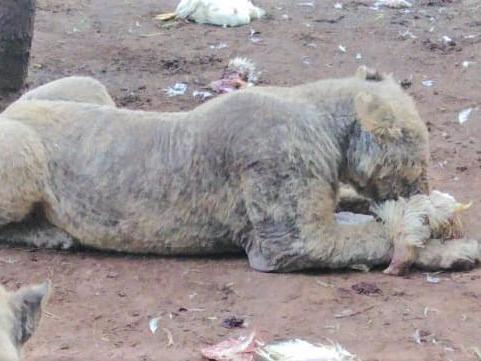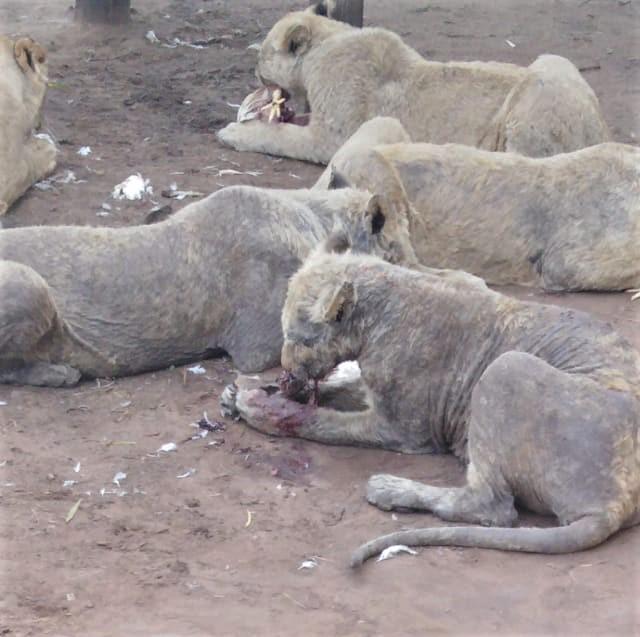Lions cubs too sick to walk due to squalid conditions at South African breeding centre
Exclusive: Inspectors who raided farm found 108 animals deprived of water and bald from mange

Your support helps us to tell the story
From reproductive rights to climate change to Big Tech, The Independent is on the ground when the story is developing. Whether it's investigating the financials of Elon Musk's pro-Trump PAC or producing our latest documentary, 'The A Word', which shines a light on the American women fighting for reproductive rights, we know how important it is to parse out the facts from the messaging.
At such a critical moment in US history, we need reporters on the ground. Your donation allows us to keep sending journalists to speak to both sides of the story.
The Independent is trusted by Americans across the entire political spectrum. And unlike many other quality news outlets, we choose not to lock Americans out of our reporting and analysis with paywalls. We believe quality journalism should be available to everyone, paid for by those who can afford it.
Your support makes all the difference.Cubs at a squalid breeding centre were too ill to walk and lions were so badly neglected that many had gone bald from mange.
Inspectors who raided the South African farm found more than 100 lions, tigers, leopards and caracals in overcrowded conditions, deprived of water to drink.
They were kept in filthy enclosures where parasites spread easily.
Photos show many of the animals – destined to be either shot by hunters for money or slaughtered for their bones in the country’s lucrative industry – were almost entirely bald because of parasitic infections.
Animal-welfare officials have charged the man suspected of running the centre with breaking animal-protection law.
The big cats were part of the country’s “snuggle scam” industry that takes money from tourists who pay to pet, feed and take selfies with hand-reared lions, unaware the farms are businesses that sell the animals into their deaths – as The Independent revealed last year.
Officers from South Africa’s National Society for the Prevention of Cruelty to Animals discovered 108 neglected animals living in conditions they described as “horrendous” at Pienika Farm in the North West Province.
“Other issues such as small enclosures and inadequate shelter, no provision of water, overcrowding, and filthy and parasitic conditions were noted in the camps that contained the lions, caracals, tigers, and leopards,” said NSPCA senior inspector Douglas Wolhuter.
“Twenty-seven of the lions had mange, and the caracals were obese and unable to properly groom themselves.”
Two cubs that appeared to have a neurological condition were unable to walk, he said. They were confiscated and taken for specialist treatment.
The cubs are exploited their whole lives, first as props by tourists, then for ‘walking with lion’ safaris
It’s estimated up to 12,000 lions are raised on South Africa’s 260 captive breeding facilities. The country’s quota for exporting lion bones is 1,500 skeletons a year.

The trade in lion bones for Asian medicine grew out of the hunting of captive-bred lions.
After the squalid farm was discovered, conservation group Humane Society International/Africa called for the South African government to shut down the captive breeding industry.
Audrey Delsink, wildlife director of HSI/Africa, said: “Lion cubs are ripped from their mothers at just a few days old to be hand-reared by paying volunteers from countries such as the UK, who are misled into believing the cubs are orphans.
“The cubs are exploited their whole lives, first as props by paying tourists, then later as part of ‘walking with lion’ safaris. Once too big and dangerous for this, they are killed for their bones which are exported to Asia for traditional medicines or sold to be killed by trophy hunters largely from the United States in ‘canned’ hunts in which hand-reared lions are shot in a fenced area.”
The fate of the lions will depend on the outcome of the legal process, Ms Delsink said.
Pienika Farm is reportedly owned by Jan Steinman, a member of the council of the South African Predator Association (Sapa), which says it does not support canned lion hunting but stands for “responsible hunting”.
A statement to The Independent by Sapa said: “Sapa is aware of the complaints. It will now be dealt with in terms of the Sapa code of conduct and disciplinary process. Corrective measures will be enforced once the Sapa council processed all the facts at hand.”
Join our commenting forum
Join thought-provoking conversations, follow other Independent readers and see their replies
Comments